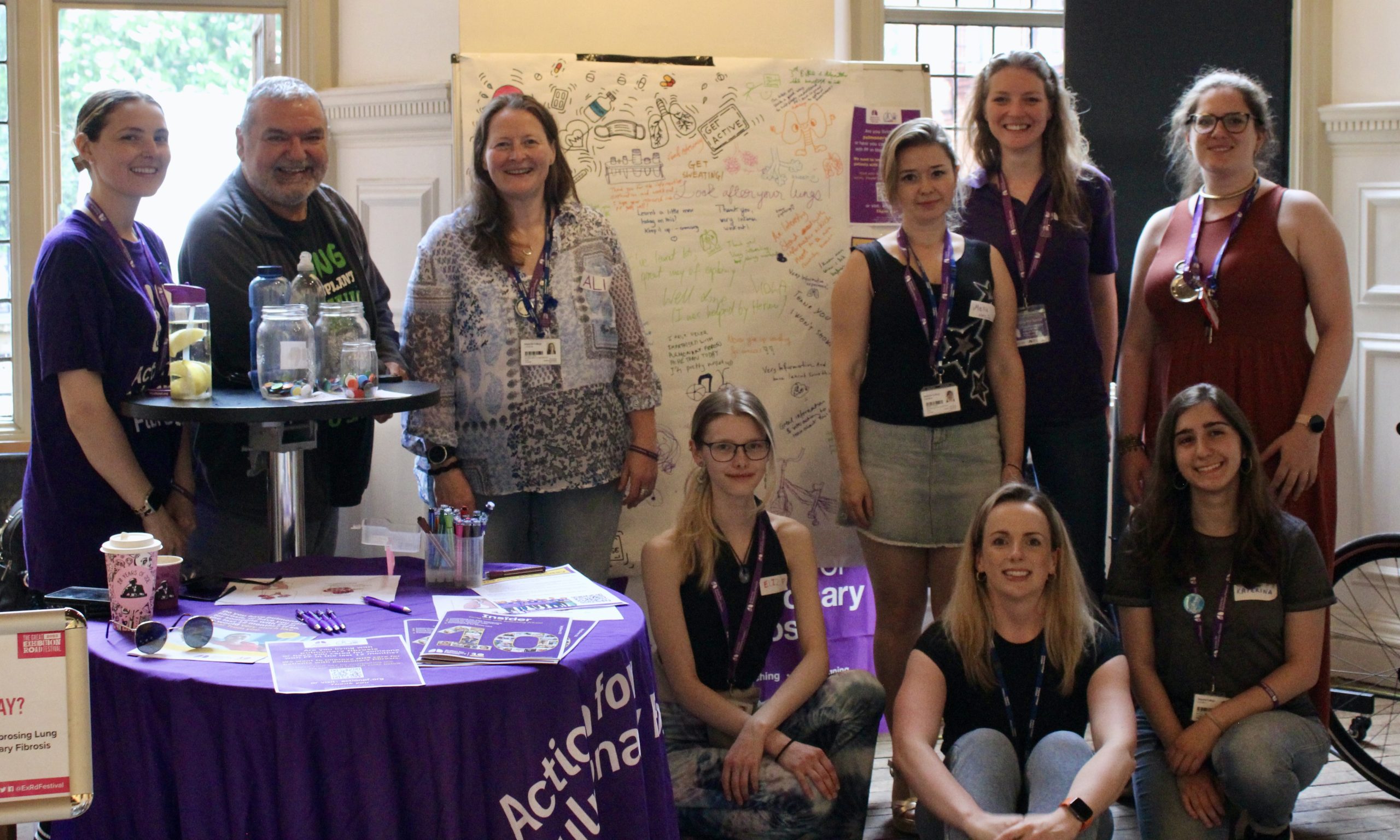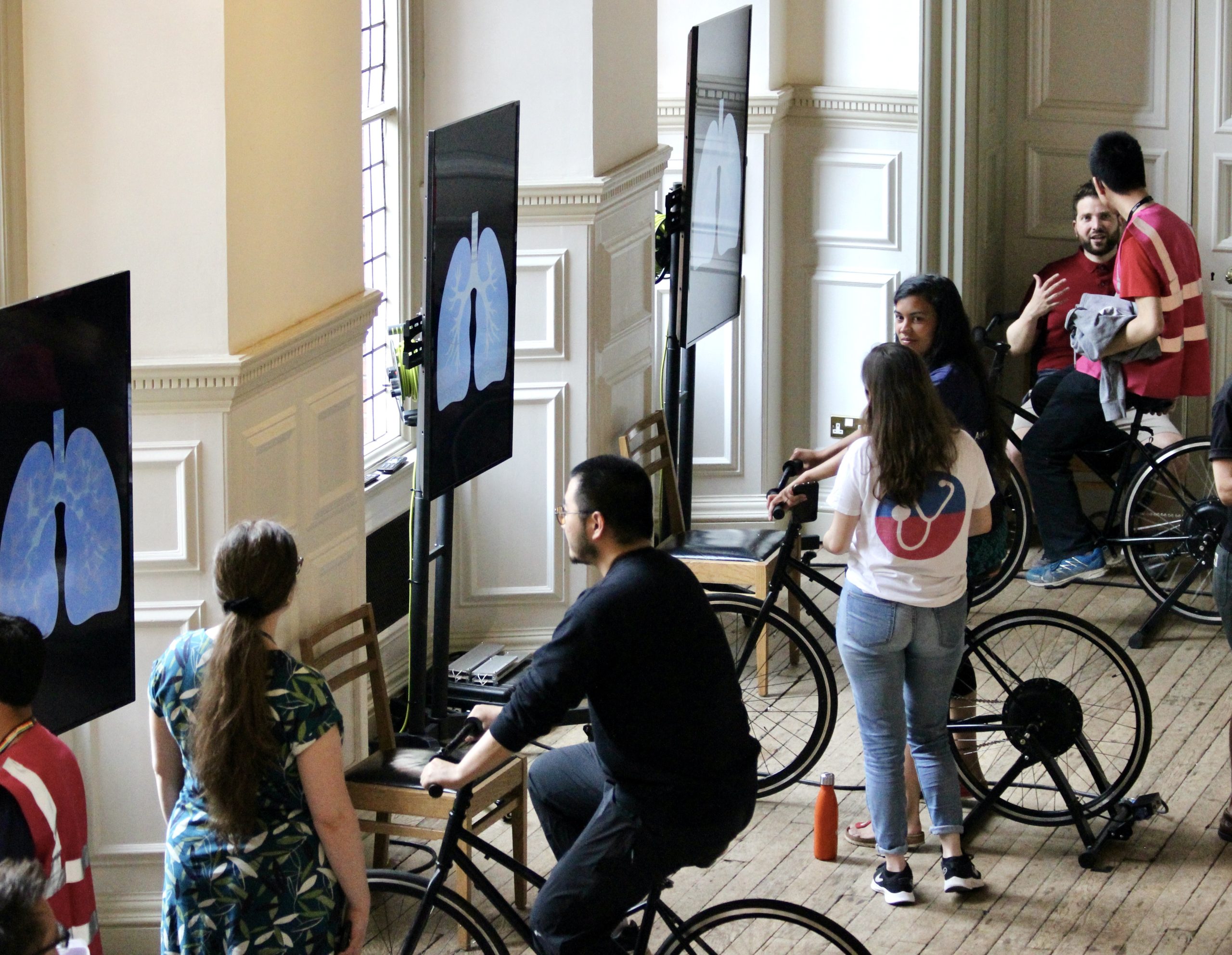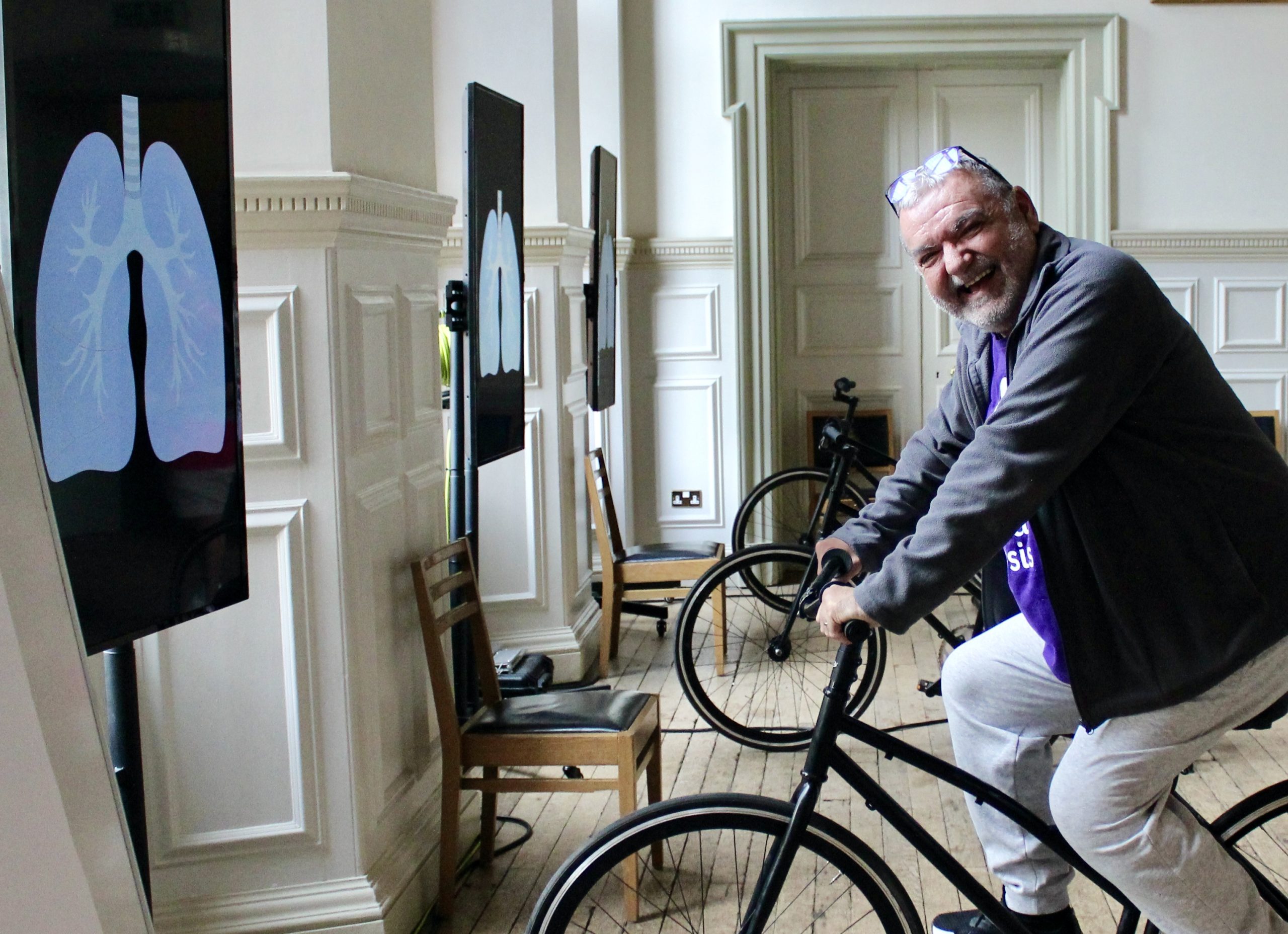
The Great Exhibition Road Festival is a free annual celebration of science and the arts each summer in South Kensington. The event showcases a diverse range of activities for people of all ages. One of those activities, led by researchers from the Margaret Turner Warwick Centre and volunteers from the charity Action for Pulmonary Fibrosis, included an interactive activity that gave the public the opportunity to walk in the shoes of someone living with pulmonary fibrosis. Find out first-hand from Elisabeth Pyman, what happened on the day and hear from pulomary fibrosis patient, Andy, what it’s like to live with the condition.
The June weekend of the Great Exhibition Road Festival was one of quintessential British summertime weather. This celebration of science was hosted by Imperial College London in collaboration with the local community and provided a wide range of topics for people of all ages to explore. Under intermittent spells of rain, crowds of a multitudinous diversity explored the “awe and wonder” of science, the theme of this year’s festival. To welcome the public, artists and scientists populated the streets and buildings surrounding Imperial’s South Kensington campus like a sudden desert bloom.
Meanwhile, another transformation was taking place in a stand tucked away at the end of the road in the Creative Science zone. Researchers from the Margaret Turner Warwick Centre and volunteers from the charity Action for Pulmonary Fibrosis were on a mission to spread awareness about a rare lung condition known as pulmonary fibrosis. This condition is associated with a build-up of scar tissue that leads to a steady decline in lung function, with many patients becoming terminal only five years after diagnosis. Currently, there are 32,500 UK residents living with a diagnosis, but the actual number of people affected is estimated at around 100,000.
Transforming hearts and minds
For two days, staff and students were on hand to engage the public in issues surrounding disease diagnosis, the need for better treatment plans, and the challenges patients and their support networks face. The primary focus of the research group is to better understand pulmonary fibrosis, in which the causes of the disease are largely unknown, to expedite the development of better therapies. Working within the group as a Master’s student, I can attest to how much effort and hard work goes into the research, and I truly admire the diligence of the team. Also present were members of Action for Pulmonary Fibrosis, a charity providing support for patients and their families. United by a common cause, volunteers at the stand hoped to spread information, inspire curiosity, and transform hearts and minds.
Perhaps inspired by the old saying ‘actions speak louder than words’, the stand organisers created an activity that would allow people to walk in the shoes of someone living with pulmonary fibrosis. This involved challenging the public to fill up a pair of animated lungs with air by pedalling on stationary bikes connected to display screens. At first glance, the three available bikes looked equally alike. However, each bike increased in difficulty from first to third, mimicking normal, mild, and severe fibrotic lungs. Nevertheless, only by jumping on the saddle and peddling for themselves would the difference in effort become apparent. Old and young, confident and unsure, all manner of people were intrigued by the activity and decided to throw their hat in the ring for one reason or another. Some were suitably exhausted after the second bike, though many eventually powered through. Even those emboldened by the ease with which they completed the first level had their hearts pumping and chests heaving by the third, severe fibrotic pair of lungs. The aim of the game, however, was not a test of fitness. By increasing the resistance of the bikes in line with the severity of the condition, we hoped that participants would discover for themselves the impact of the disease on the ability to do everyday activities.

Newfound awareness and empathy
I was heartened by the willingness of the public to give the bikes a go and the openness to learning about this debilitating condition. People often wanted to know the causes, to which all I could respond was, the fact that we still don’t know is one of the reasons for our raising public awareness. Others who asked about current treatments were saddened to learn of the lack thereof, especially after hearing how seriously patients and their families are affected. There was even an opportunity to hear about the pulmonary fibrosis experience first-hand, from a former patient who received a lung transplant. Visitors were encouraged to leave messages on our whiteboard, which included sentiments such as ‘look after your lungs’ and ‘an effective way to teach people about this disease’. So, although we dealt with some heavy but important themes, the activity was generally fun and informative.
With the festival as our forum, we opened the discussion about pulmonary fibrosis to the broader population and created opportunities for people to connect. Although most visitors had never heard of pulmonary fibrosis before visiting the stand, each came away with a newfound awareness and, many, a newfound empathy. Even those with friends or family affected by the disease, or even patients themselves, were sometimes unaware of Action for Pulmonary Fibrosis and came away with a new resource for support. I was certainly left with awe and wonder from the many interesting conversations I had and seeing the fire of curiosity alight in many eyes. From the positive impact of the experience on myself, I believe that involving the public in the conversation and transforming hearts and minds will bring us one step closer to transforming patient lives.
Patient perspective: Andy’s pulmonary fibrosis journey
I lived with pulmonary fibrosis for many years until it nearly killed me in 2018. I was fortunate to receive a double lung transplant thanks to my “unknown saviour”.
However, during my pulmonary fibrosis journey, I worked for Birmingham City Council and encountered many people from various backgrounds daily. Initially, they would hear my hacking cough or my breathlessness. In the final four years, they would see the oxygen cylinders or portable oxygen concentrator leading to the nasal cannula providing me with the necessary oxygen to keep me topped up to get me through the day. During that time, most people would kindly ask if I needed a bottle of water or if they could help.
Some of the more inquisitive people would ask me what was wrong.
“Do you have asthma, lung cancer or COPD?”
My reply was, “No, I have pulmonary fibrosis”.
“What’s that?” was the usual response.
I would then spend the next 10 or 15 minutes explaining what it is and how frustrating it was for me to live the life I had with little understanding from those that weren’t “in the know”.
Following my transplant, I gave up my role at the council and joined Action for Pulmonary Fibrosis. They had helped me for several years as a patient and I now had the opportunity to raise awareness of the disease and how it affected all those living with it…patients, partners, carers, children, grandchildren and friends. During the 18 months I have been working there I have seen so much change that will improve their lives.
In June 2023, I was fortunate to be part of the Great Exhibition Road Festival with colleagues from APF, staff from the NHLI and my middle child Jess. We all spent two days engaging with the public showing them the devastating effects of pulmonary fibrosis at various stages. As a patient with lived experience, I saw how exhausted they were at the end of the ordeal and told them “I know how you feel, genuinely I do. Now imagine that that is your day, every day of every week doing the most mundane of tasks. Showering, putting on clothes, walking only a small distance.”
I am positive that everyone who took the time to take part left the stand with a deeper and more profound understanding of what it means to live with pulmonary fibrosis. As a patient, I have the passion and the will to change the world when it comes to pulmonary fibrosis but I was amazed and touched that all those from the NHLI exhibited the same passion. I was also proud of my daughter Jess (she is a 30-year-old primary school teacher). I heard her tell visitors things that she had endured during my pulmonary fibrosis and transplant journey that I didn’t know. Afterwards, we discussed them quietly together, we shed a tear and embraced.
We were both so pleased to have made a difference in those two days and we look forward to doing it again in the future.
